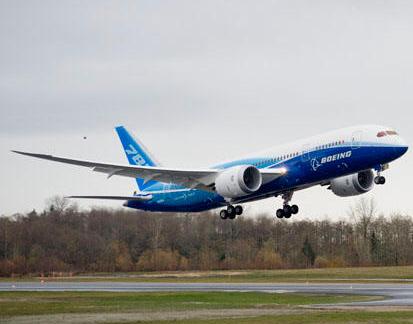
NEWSROOM
 |
NEWSROOM |
|
|
|
|
|||
|
Boeing’s 787 Dreamliner Makes Historic First Flight |
||||
 |
December 16, 2009 - The Boeing 787 Dreamliner took to the sky for the first time on Tuesday, ushering a new era in air travel as it departed before an estimated crowd of more than 12,000 employees and guests from Paine Field in Everett, Wash.The flight marks the beginning of a flight test program that will see six airplanes flying nearly around the clock and around the globe, with the airplane's first delivery scheduled for fourth quarter 2010.The newest member of the Boeing family of commercial jetliners took off from Paine Field in Everett, Wash. at 10:27 a.m. local time. After approximately three hours, it landed at 1:33 p.m. at Seattle's Boeing Field.787 Chief Pilot Mike Carriker and Capt. Randy Neville tested some of the airplane's systems and structures, as on-board equipment recorded and transmitted real-time data to a flight-test team at Boeing Field. After takeoff from Everett, the airplane followed a route over the east end of the Strait of Juan de Fuca. |
|||
|
Capts. Carriker and Neville took the airplane to an altitude of 15,000 feet (4,572 meters) and an air speed of 180 knots, or about 207 miles (333 kilometers) per hour, customary on a first flight. It was is truly a proud and historic day for the global team who has worked tirelessly to design and build the 787 Dreamliner - the first all-new jet airplane of the 21st century," said Scott Fancher, vice president and general manager of the 787 program. "We look forward to the upcoming flight test program and soon bringing groundbreaking levels of efficiency, technology and passenger comfort to airlines and the flying public." Powered by two Rolls-Royce Trent 1000 engines, the first Boeing 787 will be joined in the flight test program in the coming weeks and months by five other 787s, including two that will be powered by General Electric GEnx engines. The 787 Dreamliner will offer passengers a better flying experience and provide airline operators greater efficiency to better serve the point-to-point routes and additional frequencies passengers prefer. The technologically-advanced 787 will use 20 percent less fuel than today's airplanes of comparable size, provide airlines with up to 45 percent more cargo revenue capacity and present passengers with innovations that include a new interior environment with cleaner air, larger windows, more stowage space, improved lighting and other passenger-preferred conveniences. |
||||
|
||||||||||||||
| ©AvStop Online Magazine Contact Us Return To News | ||||||||||||||
|